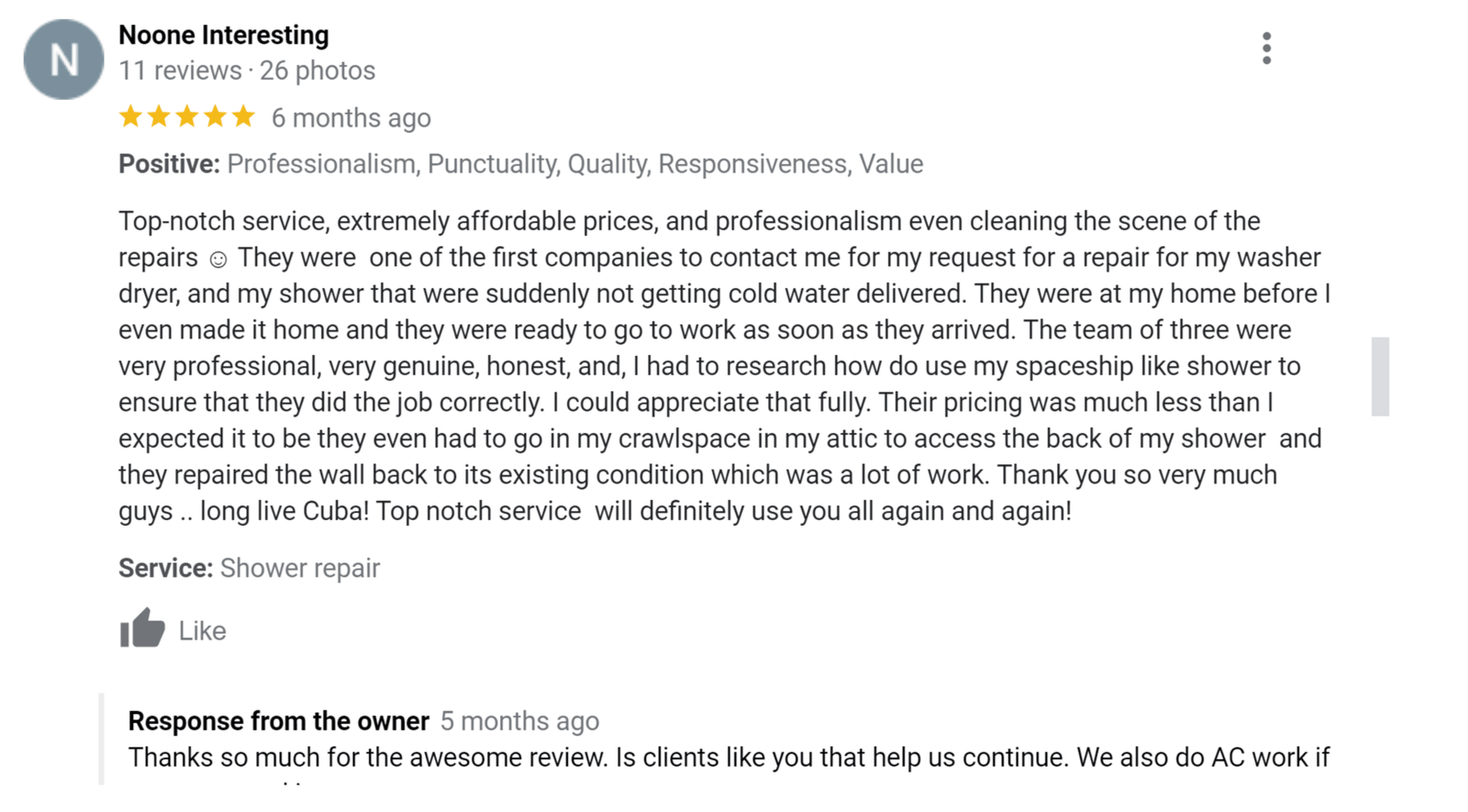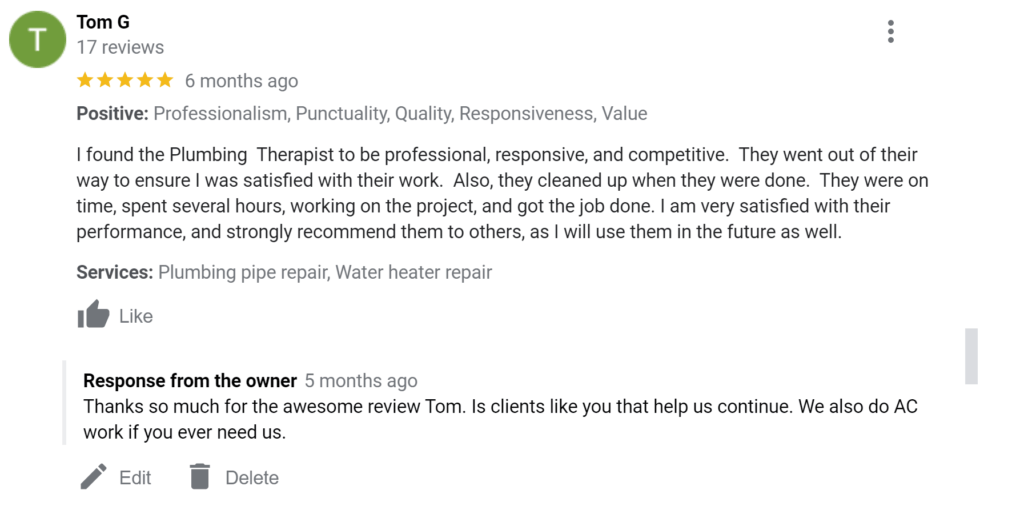Heat Pump Water Heater Installation
A heat pump water heater is an energy-efficient system that extracts heat from the air to heat water. Installation involves placing the unit in an appropriate location, connecting it to your plumbing, and ensuring proper electrical connections.
Do You Need Our Help ?
Feel free to contact us now
$99 Water Heater Flush + Free Plumbing System Inspection
Heat Pump Water Heater Installation in Tampa Bay
Your Trusted Choice for Heat Pump Water Heater Installation Services in Hillsborough County, Pinellas County, and Pasco County
A heat pump water heater is a type of water heating system that operates differently from traditional electric or gas water heaters. It uses a heat pump to transfer heat from the surrounding air or ground into the water, rather than directly generating heat.
At Plumbing Therapist, we’re your top choice for Heat Pump Water Heater Installation services in the Tampa Bay area. If you’re ready to embrace a more efficient, eco-friendly, and budget-conscious approach to hot water, you’re in the right place. Our team of skilled plumbers is committed to delivering seamless installations that bring you the benefits of savings and sustainability. Get ready to transform your hot water experience with our expert heat pump water heater installations.
Our Heat Pump Water Heater Installation Process:
Assessment: Our skilled technicians will evaluate your property and hot water needs to determine the most suitable heat pump water heater model for you.
Location Selection: We’ll help you choose the optimal location for your new system, considering factors like space availability and proximity to existing plumbing and electrical connections.
Installation: Our experienced plumbers will expertly install your heat pump water heater, ensuring all plumbing and electrical connections are secure and compliant with safety standards.
Testing: We rigorously test the system to guarantee it’s functioning correctly and delivering the hot water you expect.
Maintenance Tips: We’ll provide you with valuable tips on how to maintain your heat pump water heater to ensure its efficiency and longevity.
Why Choose Plumbing Therapist?
Expertise: With years of experience in plumbing and heating services, we have the knowledge and skills to handle your heat pump water heater installation with precision.
Quality Service: We take pride in our commitment to delivering top-quality service. Your satisfaction is our priority.
Affordability: We offer competitive pricing without compromising on the quality of work. Enjoy cost-effective installation services.
Customer-Focused: We value our customers and aim to exceed your expectations in every way, from start to finish.
Upgrade your hot water system with Plumbing Therapist’s Heat Pump Water Heater Installation services. Experience the benefits of energy efficiency, sustainability, and consistent hot water supply. Contact us today to schedule your installation or request a consultation. Your comfort and savings await!

Why partner with Plumbing Therapist?
Quality, Affordability, and Expertise.

No Hidden or Unexpected Charges

Free Estimates & Online Booking Available

Professionally Trained Technicians

Honesty is Guaranteed

Quick Communication & Service Within 24 Hours

400+ 5 Star Reviews

Why do you need to install a Heat Pump Water Heater?
As Plumbing Therapist, we recommend Heat Pump Water Heater Installation for several compelling reasons:
Energy Efficiency: Our heat pump water heaters are exceptionally energy-efficient. By harnessing heat from the surroundings, they reduce your energy consumption, leading to lower utility bills.
Cost Savings: While the initial investment may be slightly higher, the long-term savings on energy costs make it a financially savvy choice. You’ll see a noticeable reduction in your monthly utility expenses.
Eco-Friendly: We care about the environment. Heat pump water heaters produce fewer emissions, contributing to a greener and more sustainable future for our planet.
Consistent Hot Water: Say goodbye to hot water shortages. Our systems ensure a reliable and continuous supply of hot water for all your needs.
Durability: Plumbing Therapist’s heat pump water heaters are built to last, offering longevity and reliability that surpasses traditional heaters.
Installation Versatility: Our experts can install these systems in various locations to suit your property’s layout and needs.
Quiet Operation: Enjoy a peaceful environment as our heat pump water heaters operate quietly.
Financial Incentives: Depending on your location, you may be eligible for incentives or rebates, further reducing your upfront costs.
Property Value: Boost your property’s value with an energy-efficient heating system, making it more appealing to potential buyers.
In summary, Plumbing Therapist recommends Heat Pump Water Heater Installation as a cost-effective, eco-friendly, and reliable solution for your hot water needs. It’s an investment that pays off both in savings and sustainability.
If you would like more information, feel free to give them a call at (813)-437-4477 or you can book online and get their latest discount!
Customer Testimonials: Real Experiences with Plumbing Therapist
We proudly share the experiences and stories of our valued clients. Their feedback provides a glimpse into the quality of service and commitment to excellence we uphold at Plumbing Therapist. You'll read firsthand how our plumbing solutions have improved comfort and efficiency in homes across Tampa Bay. These testimonials illustrate our dedication to customer satisfaction and the difference our expert services can make.




Your questions answered
Common Heat Pump Water Heater Installation Questions:
What is a Heat Pump Water Heater?
A Heat Pump Water Heater is an energy-efficient water heating system that operates by transferring heat from the surrounding air or ground to heat the water. Unlike traditional water heaters that generate heat directly using electricity or gas, heat pump water heaters use a heat pump mechanism to move and amplify heat, making them highly efficient. Here’s how they work:
Heat Extraction: The heat pump unit extracts heat from the air (air-source heat pump) or the ground (ground-source or geothermal heat pump). It does this by using a refrigerant that evaporates at low temperatures.
Heat Transfer: The heat extracted from the air or ground is transferred to a coil or heat exchanger through the refrigerant. As the refrigerant releases heat, it condenses back into a liquid state.
Hot Water Production: The heat transferred from the refrigerant raises the temperature of the water in the coil or heat exchanger. This heated water is then stored in a tank or used directly for hot water needs in your home or business.
Key Benefits of Heat Pump Water Heaters:
Energy Efficiency: They are significantly more energy-efficient than traditional electric water heaters because they move heat rather than generate it, resulting in potential energy savings and reduced utility bills.
Environmental Friendliness: Heat pump water heaters produce fewer greenhouse gas emissions because they utilize existing heat from the environment, making them a greener choice.
Consistent Hot Water Supply: They provide a steady and reliable supply of hot water, ensuring you don’t run out during peak usage times.
Longevity: With proper maintenance, heat pump water heaters typically have a longer lifespan than traditional heaters, providing reliability over time.
Heat pump water heaters are a popular choice for those looking to save on energy costs and reduce their environmental impact while enjoying a consistent supply of hot water.
How Does a Heat Pump Water Heater Save Energy and Money?
A Heat Pump Water Heater saves energy and money through its energy-efficient operation, which is fundamentally different from traditional electric or gas water heaters. Here’s how it achieves these savings:
Heat Transfer Mechanism: Unlike conventional water heaters that generate heat directly using electricity or gas, a heat pump water heater uses a heat transfer mechanism. It extracts heat from the surrounding air (air-source) or the ground (ground-source or geothermal) and transfers it to the water. This process requires less energy to produce hot water.
Efficient Heat Extraction: The heat pump unit contains a refrigerant that evaporates at low temperatures. It efficiently extracts heat from the air or ground, even when the temperature is relatively low. This means it can operate effectively in various climates.
Heat Amplification: The heat extracted from the air or ground is amplified through the refrigerant cycle. It undergoes compression and condensation, releasing a greater amount of heat energy than the energy consumed by the heat pump unit itself.
Reduced Energy Input: Traditional water heaters rely on direct heating elements or burners that consume a significant amount of electricity or gas. In contrast, a heat pump water heater primarily uses electricity to power the heat pump’s compressor and fan, which move and concentrate heat. This results in lower energy consumption.
Lower Utility Bills: The reduced energy consumption directly translates into lower utility bills. Homeowners typically see significant savings on their monthly energy costs when using a heat pump water heater.
Environmental Benefits: Because heat pump water heaters extract and utilize existing heat from the environment, they produce fewer greenhouse gas emissions compared to traditional heaters that burn fossil fuels. This makes them an environmentally friendly choice.
Longer Lifespan: Heat pump water heaters often have a longer lifespan than traditional heaters, reducing the frequency of replacements and long-term costs.
It’s important to note that the extent of energy and cost savings depends on factors like the climate, the efficiency of the heat pump unit, and the hot water usage patterns in your household. However, in general, Heat Pump Water Heaters offer a more efficient and cost-effective way to heat water, making them a smart choice for homeowners looking to reduce energy bills and their environmental footprint.
Where Should I Install the Heat Pump Water Heater?
The installation location of a Heat Pump Water Heater is a crucial consideration to ensure its efficiency and proper operation. Here are some guidelines for choosing the right installation spot:
Indoor vs. Outdoor Installation:
- Heat pump water heaters can be installed either indoors or outdoors. The choice depends on factors like available space, climate, and local regulations.
- Indoor installations are typically preferred in colder climates to prevent freezing during winter. They require adequate ventilation to dissipate heat generated during the heating process.
- Outdoor installations are common in warmer climates and can save indoor space. They should be protected from direct sunlight and extreme weather conditions.
Space Availability:
- Choose a location with sufficient space to accommodate the heat pump unit and the water storage tank (if it’s not a tankless system). Ensure there is enough clearance for installation, maintenance, and proper airflow around the unit.
Ventilation and Airflow:
- Proper ventilation is essential for indoor installations to remove heat generated by the heat pump. Adequate airflow helps maintain the unit’s efficiency.
- Ensure that there is enough room for air circulation around the heat pump water heater. Avoid obstructing vents or air intake/exhaust openings.
Accessibility for Maintenance:
- Accessibility for routine maintenance and potential repairs is crucial. Choose a location where technicians can easily access the unit without obstacles.
Noise Considerations:
- Heat pump water heaters operate quietly, but some noise may be generated. Consider the proximity to living spaces and bedrooms when selecting the installation site.
Plumbing Connections:
- The chosen location should have easy access to the existing plumbing connections, including hot and cold water supply lines and drainage.
Electrical Connections:
- Ensure that the installation site has the necessary electrical supply and wiring to support the heat pump water heater’s electrical requirements.
Compliance with Local Regulations:
- Check local building codes and regulations regarding the installation of heat pump water heaters. Compliance with safety and zoning requirements is essential.
Protection from Physical Damage:
- Avoid installing the unit in areas prone to physical damage or where it might be exposed to harsh environmental conditions.
Tankless Systems:
- If you’re installing a tankless heat pump water heater, it can be mounted on a wall, saving floor space. Ensure it is positioned at the appropriate height for ease of access.
Always consult with a professional plumber or HVAC technician to determine the best installation location for your specific circumstances. They can assess your property and ensure that the chosen location meets all safety and efficiency requirements.
What Is the Maintenance Required for a Heat Pump Water Heater?
Maintaining a Heat Pump Water Heater is essential to ensure its continued efficiency and longevity. Here are the key maintenance tasks typically required:
Regular Cleaning:
- Keep the heat pump unit’s air intake and exhaust areas free from debris, dust, and obstructions. A clean heat exchanger and coils ensure optimal heat transfer efficiency.
Change or Clean Air Filters:
- Some heat pump water heaters have air filters that need regular inspection and cleaning or replacement. Clean filters ensure proper airflow and prevent dust buildup.
Check for Leaks:
- Inspect the unit and its connections regularly for any signs of leaks, including water or refrigerant leaks. Address leaks promptly to prevent damage.
Inspect Electrical Connections:
- Check electrical connections and wiring for signs of wear or damage. Ensure that all connections are tight and secure.
Monitor Performance:
- Keep an eye on the unit’s performance. If you notice a decrease in hot water supply or efficiency, it could indicate an issue that needs attention.
Annual Professional Inspection:
- Schedule an annual inspection by a qualified HVAC technician or plumber who is experienced in heat pump water heaters. They can perform a comprehensive check, including refrigerant levels, electrical components, and overall system health.
Refrigerant Maintenance:
- Heat pump water heaters use refrigerant to transfer heat. If there is a refrigerant leak or loss, it can affect the system’s efficiency. A professional should handle any refrigerant-related maintenance or repairs.
Drain the Tank (If Applicable):
- If your heat pump water heater has a tank, it’s advisable to drain and flush the tank annually to remove sediment buildup, which can affect heating efficiency.
Inspect Anode Rod (If Applicable):
- If your unit has an anode rod, check it during annual maintenance. The anode rod helps prevent corrosion in the tank. Replace it if it’s significantly corroded.
Verify Ventilation:
- For indoor installations, ensure that the ventilation system is clean and functioning correctly to dissipate heat effectively.
Address Insulation:
- Check and maintain insulation around the hot water pipes to minimize heat loss during distribution.
Programmable Thermostat Adjustment:
- If your heat pump water heater has a programmable thermostat, ensure it’s correctly set to meet your hot water needs efficiently.
Address Water Quality:
- Consider water quality and the potential for scale buildup, especially in hard water areas. Install water softeners or descaling systems if needed.
Keep the Surrounding Area Clean:
- Maintain cleanliness in the area where the heat pump water heater is installed, ensuring there are no obstructions or debris that could affect its operation.
Remember that specific maintenance requirements can vary based on the make and model of your heat pump water heater. Always refer to the manufacturer’s guidelines and consult with a professional technician for any maintenance or repairs beyond routine cleaning and inspections. Regular maintenance helps ensure your heat pump water heater continues to operate efficiently and reliably.
What Are the Benefits of Switching from a Traditional Water Heater to a Heat Pump Water Heater?
Switching from a traditional water heater to a Heat Pump Water Heater offers several significant benefits:
Energy Efficiency: Heat pump water heaters are highly energy-efficient. They use a heat transfer process to move and amplify heat from the environment, consuming less electricity than traditional water heaters. This leads to lower energy bills and reduced operating costs.
Cost Savings: Due to their energy efficiency, homeowners typically experience substantial cost savings on their monthly utility bills when using a heat pump water heater. The initial investment is often offset by long-term savings.
Environmental Responsibility: Heat pump water heaters produce fewer greenhouse gas emissions because they rely on extracting and transferring heat rather than burning fossil fuels. Choosing a heat pump system contributes to a greener and more sustainable future.
Consistent Hot Water Supply: Heat pump water heaters provide a reliable and consistent supply of hot water, ensuring you don’t run out during peak usage times. This is particularly advantageous for larger households.
Longer Lifespan: With proper maintenance, heat pump water heaters tend to have a longer lifespan than traditional water heaters. This means fewer replacements over time and less waste.
Versatility in Installation: Heat pump water heaters can be installed in various locations, both indoors and outdoors, to suit your property’s layout and climate. They offer flexibility in placement.
Quiet Operation: Heat pump water heaters operate quietly, without the noise associated with some traditional water heaters. This ensures a more peaceful environment in your home.
Financial Incentives: Depending on your location, you may be eligible for government incentives, rebates, or tax credits for installing an energy-efficient heat pump water heater, further reducing your upfront costs.
Increased Property Value: An energy-efficient heating system like a heat pump water heater can increase the resale value of your property. It’s an attractive feature for potential buyers concerned about energy efficiency.
Compatibility with Renewable Energy: Heat pump water heaters can be paired with solar panels or other renewable energy sources, maximizing energy efficiency and reducing reliance on the grid.
Reduced Heat Loss: Traditional water heaters can lose heat over time, requiring them to reheat the water. Heat pump water heaters minimize heat loss, improving overall efficiency.
No Combustion Risk: Unlike gas water heaters, heat pump water heaters don’t rely on combustion, eliminating the risk of gas leaks or carbon monoxide emissions.
In summary, switching to a Heat Pump Water Heater is a smart choice for homeowners looking to save money on energy bills, reduce their environmental impact, and enjoy a reliable supply of hot water. It’s an investment that pays off both in terms of cost savings and environmental responsibility.
